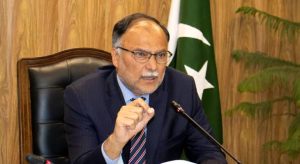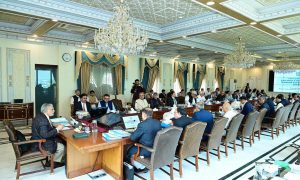On Wednesday, the government gave a conditional green light for the construction of the Dasu hydropower project, which has now skyrocketed in cost to Rs1.74 trillion—an eye-popping 240% increase. They also decided to set up a new border crossing post at Wagah with India.
The Executive Committee of the National Economic Council (ECNEC) made these decisions and also approved the building of 30 anti-smuggling posts along the River Indus and in Balochistan, with a budget of Rs15 billion.
In total, ECNEC reviewed 10 projects for approval, amounting to Rs2.1 trillion, including the Dasu hydropower project, which was added to the agenda. Deputy Prime Minister Ishaq Dar led the meeting, which is responsible for approving major development initiatives.
The revised Dasu project received conditional approval at a staggering cost of Rs1.7 trillion, or about $6.2 billion. Just last month, the Planning Minister referred to this cost as an “astronomical increase” of 240%.
This conditional approval is aimed at easing loan negotiations with foreign lenders. Additionally, it was decided that a helicopter will be acquired under the supervision of the Cabinet Secretary to ensure the safe travel of Chinese contractors working on the Dasu hydropower project. Officials noted that a committee from the Planning Commission will still need to review the project costs.
When compared to the original budget, the cost of the hydropower project has surged by Rs1.3 trillion, with the per-unit cost of what was supposed to be the cheapest water-based power generation scheme now hitting Rs8.79. The initial project cost was Rs479 billion.
During a meeting of the Central Development Working Party, Planning Minister Ahsan Iqbal directed that a third-party validation be conducted to assess the significant increase in the revised PC-I.
On Wednesday, Planning Minister Ahsan Iqbal refrained from commenting on questions regarding the approval of the Dasu hydropower project as an additional agenda item or the construction of the new border crossing with India.

The project’s cost has ballooned to $6.2 billion, which is nearly on par with the $6.7 billion it takes to construct a railway track from Karachi to Peshawar as part of the China-Pakistan Economic Corridor (CPEC).
Originally, this project was set to produce 2,160MW of electricity, but now the government finds itself in need of additional loans, both from foreign and local sources. Wapda is currently in talks with the World Bank for a substantial new loan of $1 billion. This loan will consist of a mix of high-interest and concessional loans, with the World Bank already having provided $517 million for the project.
Additionally, the government is set to secure a $400 million foreign commercial loan backed by World Bank guarantees. They are also on the lookout for Rs350 billion in domestic commercial loans.
Previously, the government initiated an inquiry to uncover the reasons behind the rising costs, but it failed to hold any specific entity or individual accountable, instead shifting blame towards Chinese contractors, Wapda, and the Planning Commission.
The inquiry also pointed fingers at the local administration of Kohistan district for dragging its feet on land acquisition. It noted that the costs shot up by Rs48 billion due to heightened security measures following two tragic attacks on Chinese contractors. Interestingly, the security arrangements only accounted for about 3.8% of the total cost increase.
In a recent move, the ECNEC greenlit the construction of a new border crossing at Wagah with India. The government is already working on a project funded by the Development Bank to set up border crossing points along the Afghanistan border.
Back in July of last year, the committee decided that a similar post would be established at the crucial Wagah border crossing with India. With a budget of Rs95.5 billion, two sites are currently under construction at the Torkham and Chaman international borders.
The contract for the Wagah post will be awarded through competitive bidding, as per the committee’s decision.
ECNEC has requested the planning ministry to provide its recommendation on whether to construct the Wagah border crossing site through a government deal or via international competitive bidding. The committee informed ECNEC that, based on lessons learned from the current contract, evidence from the FBR, and a comparative analysis of the pros and cons of both open and government-to-government contracts, along with ADB’s procurement regulations and Public Procurement Rules, it would be wise to go with competitive bidding.

Additionally, ECNEC approved the establishment of 30 anti-smuggling checkpoints along the River Indus, Hub, and in Balochistan, with an estimated cost of nearly Rs15 billion. The Federal Board of Revenue acknowledged before ECNEC that traditional anti-smuggling methods have not been effective, leading to a staggering Rs750 billion in revenue losses for the economy due to smuggling.
The project is all about setting up Digital and Mobile Enforcement Stations (DES) and upgrading check-posts to tackle smuggling, boost tax revenue, encourage formal trade, and enhance border security using tech-driven enforcement. This initiative includes developing 10 DES sites in Balochistan, along with 11 small, 6 medium, and 3 large DES sites in specific locations.
ECNEC has given the green light to the Sindh Flood Emergency Rehabilitation Project Phase-II, which comes with a budget of Rs12.2 billion. This phase focuses on restoring and rehabilitating 19 roads that stretch over 146 kilometers across four districts hit hard by the floods.
Additionally, ECNEC has approved a revised project to repair 100 locomotives, costing Rs16 billion. They also sanctioned a project in Khyber Pakhtunkhwa, now set at a revised cost of Rs113 billion, aimed at improving rural access to markets, education, and health facilities by rehabilitating an 878 km rural road network.

The Mangi Dam project, with a revised budget of Rs19 billion, has also been approved. Its main goal is to address the current water shortfall faced by Quetta City. Right now, the drinking water availability in the Quetta valley is significantly below the minimum requirement of 15 gallons per person per day. With a target consumption of 20 gallons per person per day, Quetta’s water needs are estimated at 40.9 million gallons per day (76.0 cusecs). The proposed Mangi Dam is expected to provide 8.1 million gallons per day (15.1 cusecs) to the city.
Lastly, ECNEC has approved a project called “Sindh Early Learning Enhancement Through Classroom Transformation,” which is valued at Rs46.6 billion. This initiative is set to be funded by the World Bank and the Government of Sindh. The project aims to tackle critical supply-side gaps by using a mix of results-based financing and traditional spending methods to improve school availability, teacher distribution, and learning outcomes throughout the province.
The ECNEC has given the green light to the 220kV Transmission System Network Reinforcement project in Islamabad and the Burhan Area, with a budget of Rs11.3 billion. This initiative aims to boost the capacity of the national transmission system, addressing the current transmission limitations to keep up with the increasing load demand from IESCO. It also ensures a reliable distribution of the upcoming generation from the Tarbela 5th extension project.
For the latest updates and insights on new developments, visit the NEWSON


